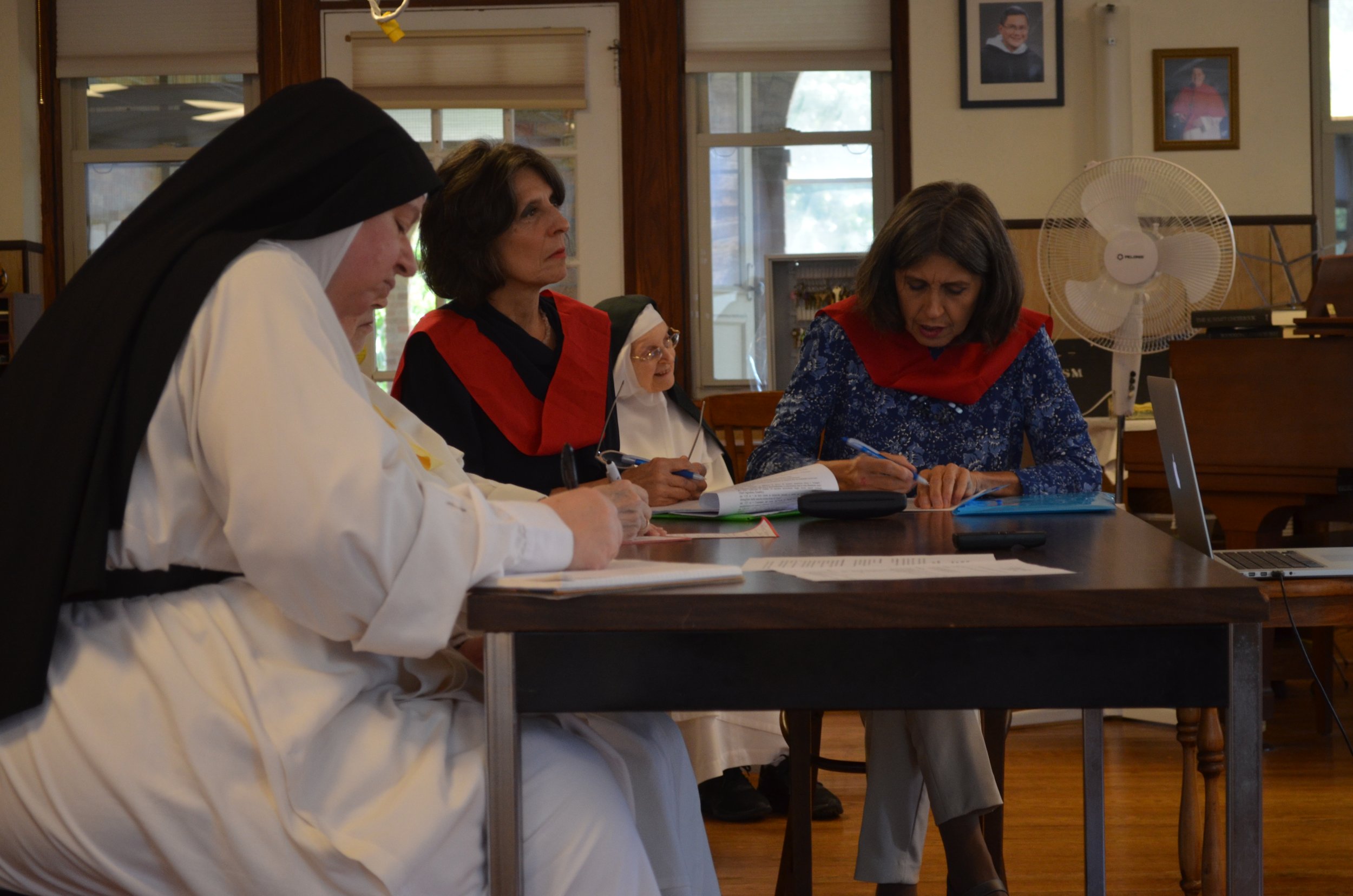Summer Studies



A few weeks ago in July, we hosted the final year of the Monastic Theological Studies program cycle which began in 2017. The Monastic Theological Studies program is coordinated by our Association (the North American Association of Dominican Monasteries) for the sisters in our monasteries who are in temporary vows. The sisters meet each year for two weeks over the summer at one of our monasteries, and professors (usually Dominican friars) come to teach the classes. The program is a great blessing to the sisters, not only for the intellectual formation it provides, but also as a chance to meet and get to know sisters from other monasteries. The program is usually 4 years long, but this cycle wound up being 5 years since the sisters had to miss a year in 2020 due to COVID.
The study program concluded with a Disputatio, a medieval-style debate, between the groups of students overseen by Teodora and Margherita Rossi, sisters who are both professors at the Angelicum in Rome specializing in Moral Theology and Thomistic Studies, respectively. The subject of the debate was “Whether it is true that wicked people enjoy prosperity and fortune while good people do not.” The teams and debate positions were drawn by lot, and the sisters had a few days to prepare their arguments. The two sides argued their positions from slightly different angles. The “pro” side (composed of Sr. Maria Johanna and Sr. Mary Ana) argued that it is true that this does sometimes happen, because rewards for good and punishments for evil do not primarily come in this life, but rather, God “makes his sun rise on the evil and on the good, and sends rain on the just and on the unjust.” (Mt 5:45) God designed the world to function according to certain natural laws, which means that good and bad fortune, natural disasters, and so on happen according to the laws of nature, and not usually as divine reward or vengeance for a person’s actions. So it is true that sometimes, in this life, there are wicked people who are wealthy and prosperous while there are good people who suffer from a lack of material possessions.
The “contra” side, composed of Sr. Andre Marie (Menlo Park CA), Sr. Mary Therese (Lufkin, TX), and Sr. Lucia Marie (Summit), were responsible for coming up with objections against the thesis. They attacked the thesis from a number of angles: the impossibility of human judgment determining another person’s moral status as good or wicked since we can see a person’s external actions but cannot see the motivations of the heart, the fact that although wicked people may possess a certain prosperity they do not really enjoy it since, as St. Thomas says, “happiness is the reward of virtue”, while material possessions will never satisfy the human heart, and the fact that wicked people lack the most important kind of prosperity: virtue and supernatural grace, while all good people possess these goods. Ultimately, the most happy and “prosperous” people are the saints in heaven who enjoy every kind of good, while the most un-prosperous and miserable are the wicked in hell, who suffer every kind of torment.
A disputatio begins with one side presenting a fully developed argument for or against the thesis - for our disputatio this was done by Sr Maria Johanna and Sr Mary Ana, arguing for the thesis. Then the opposing side presents a series of objections against the position taken by the first side. Finally, the first side has an opportunity to go through and reply to each of the objections raised. The winners of the disputatio were Sr. Maria Johanna and Sr. Mary Ana since they were successfully able to answer the opposing team’s objections by interpreting the thesis in a narrow sense and arguing that the objections, while valid in a broad sense, didn’t contradict their more narrow interpretation.
The whole community was invited to watch the debate, which was interesting and fun. The “contra” team even gave their first objection in Latin to give the proceeding a Thomistic flavor!
The study program concluded with awarding the sisters certificates of their studies over the past five years. Now, for a lifetime of continued studies! Veritas!